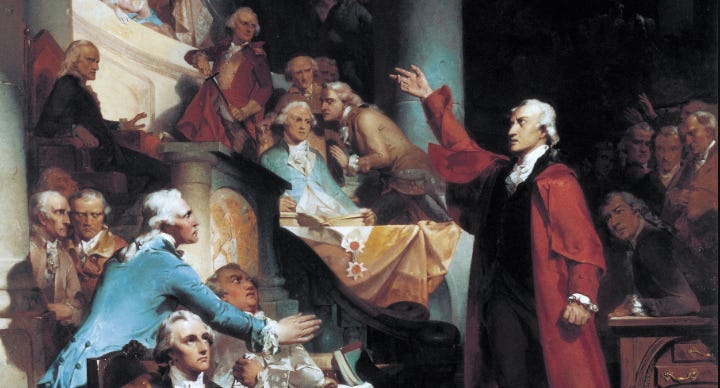Dispatch: Lamp of Experience

I know of no way of judging of the future but by the past
“I have but one lamp by which my feet are guided, and that is the lamp of experience. I know of no way of judging of the future but by the past.” —Patrick Henry
Lamp of Experience
This week there was a robust debate over the “parchment”—the Declaration of Independence and the Constitution—following remarks made by Politico reporter Heidi Przybyla about the threat of so-called Christian nationalists.
“…the thing that unites them as Christian nationalists, not Christians because Christian nationalists are very different, is that they believe that our rights as Americans and as all human beings do not come from any Earthly authority. They don't come from Congress, from the Supreme Court, they come from God. The problem with that is that they are determining—men are determining—what God is telling them. In the past, that so-called ‘natural law,’ it is a pillar of catholicism for instance, it has been used for good in social justice campaigns. Martin Luther King evoked it in talking about civil rights.
But now you have an extremist element of conservative Christians, who say that this applies specifically to issues including abortion, gay marriage, and it is going much further…”
It goes without saying that Przybyla is an historical illiterate—a common affliction in the news media—but focusing solely on her ignorance misses the more important issue: our fundamental rights and privileges are not, in fact, self-evident to everyone. This is the bedrock of American constitutionalism and the keystone of our sovereignty. Without that foundation the government’s legitimacy and its moral right to exercise power are forever suspect.
There are many directions to go from here, and I plan to write more extensively about the intellectual origins of the Revolution and American constitutionalism, but for now I’ll leave you with this…
I think it’s important that we recognize that the republic of our ancestors is gone and acknowledge privately that the American constitutional order has been replaced by something fundamentally at odds with itself. We should grieve its passing and treat it with reverence but still keep the memory burning bright.
We need to have the courage to recognize tyranny without dispiriting our friends, strengthening the hand of our enemies, or squandering what’s left of our inheritance. Furthermore, we need to grapple with our present condition much as that first generation of Americans did—with both eyes wide open. For that generation, the past did not beckon a RETVRN but served as a trusty lamp, illuminating a dark and winding path forward.
Patrick Henry speaks to this in 1775, on the cusp of the American Revolution, when the future seemed increasingly bleak:
"I have but one lamp by which my feet are guided, and that is the lamp of experience. I know of no way of judging the future but by the past..."
Though creative and resourceful, these people were firmly anchored to their past, with elites and commoners alike plumbing the depths of history for wisdom, inspiration, and ancient rights and privileges.
They were sure of themselves and convinced of the justness of their cause because they had consulted the past—embers in the ashes of history. They had an inheritance to recover, and God was on their side; they knew it.
This was no utopian project, it was a restoration of rights and privileges—a birthright they were ordained to recover; they were certain of it.
I still think we have a lot to learn from this chapter in our history. But I worry that if we continue to make excuses for tyranny and deny the decay, we will lose that vital connection to our past; the embers will fade and breathe their last, and we will have only ashes.
But to abandon this inheritance altogether is something far worse. I fear that if we cede this ground to chase after foreign theories of identity and power, we will not only dishonor our forefathers but forfeit their blessing and frivol away our strength.
One last story that I find instructive…
Before the great Chief Joseph of the Nez Perce succeeded his father to lead the Wallowa band, the elder chief walked his son through their ancestral lands in the sacred Wallowa Valley, saying, “Inside this boundary all our people were born. It circles the graves of our fathers, and we will never give up these graves to any man.”
When Joseph’s father was stricken and lying on his deathbed, he summoned the young chief one last time and made him swear an oath:
“My son, my body is returning to my mother earth, and my spirit is going very soon to see the Great Spirit Chief. When I am gone, think of your country. You are the chief of these people. They look to you to guide them. Always remember that your father never sold his country. You must stop your ears whenever you are asked to sign a treaty selling your home. A few years more and white men will be all around you. They have their eyes on this land. My son, never forget my dying words. This country holds your father's body. Never sell the bones of your father and your mother.”
With that Joseph clasped his father’s hand and promised to honor him, saying later, “A man who would not defend his father's grave is worse than a wild animal.”
Ruins of Corotoman is a reader-supported publication. To receive new posts and support my work, consider becoming a free or paid subscriber.Subscribe